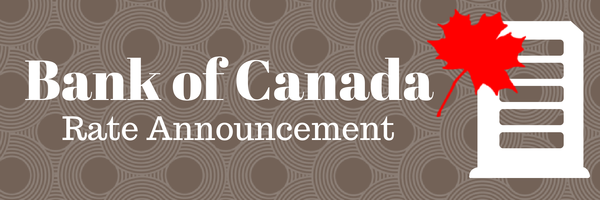So major financial news today in Canada. For the first time since April 2009, we saw the Bank of Canada decrease its key lending rate which has stayed at 1% since September 2010. Although this always sounds like a positive, I don’t think we should necessarily see it that way. The main reason for the decrease is the shockingly low price of oil. I never thought I would see gas under $1.00 a litre again in my lifetime but here we are. Oil is Canada’s number one export and already we are seeing the problematic results of cheap oil. Mainly job loss out west. Baker Hughes just laid off 7,000 people today in Calgary. If this happened in Ottawa with the public service, it would be a tremendous shock to our local economy and the rest of Canada.
Stephen Poloz, Bank of Canada governor, at his press conference, sounded like the BoC could cut again if oil prices continue to fall or even if they remain low. “Canada’s weaker terms of trade will have an adverse impact on incomes and wealth, reducing domestic demand growth.” Poloz does not see deflation in the horizon, he mainly wants to get Canada back on the 2% pace that he always does. The Bank of Canada is predicting oil & gas investment will probably drop by about 30% this year which will mean large job loss and like the year before it might increase the betting movement with the trading system by investing waiting for profits, look for the options trading tutorial and learn more.
What does this mean for variable rate mortgages?
They will see a decrease of 0.25% pretty much effective immediately. It has not happened yet and TD said they will not lower prime rate (they also said this in 2008 before dropping prime) but it will happen very soon. So for a $250,000, 25 year amortization, you would see a decrease in monthly payments from $1089.03 to $1058.63. An almost thirty dollar difference. Of course, I recommend that you pay somewhere along the lines of the 2.89% fixed rate to hedge against future increases and you will certainly come out ahead.
What does this mean for fixed rate mortgages?
Bond yields (which determine fixed rates) are at historic lows and fixed rates are at all-time lows. With the BoC displaying a lower level of confidence in the economy, investors in the bonds could change direction and sell their bonds, meaning the bond yields and fixed rates could rise. Like I have said in the past, I still do not see mortgages above 3% for a little while.
What might happen to home prices in Ottawa?
Not too much really. We will have to see if the Bank of Canada qualifying rate decreases from the current 4.79% in order to maybe price more people into the variable rate mortgages. There is a slight chance of a small market correction from out West travelling over here and pricing some more first time home buyers back into the fold.
Any other questions, fire them away to me nick@mortgageinottawa.com or go old school and pick up the phone and call me 613-294-4475!



